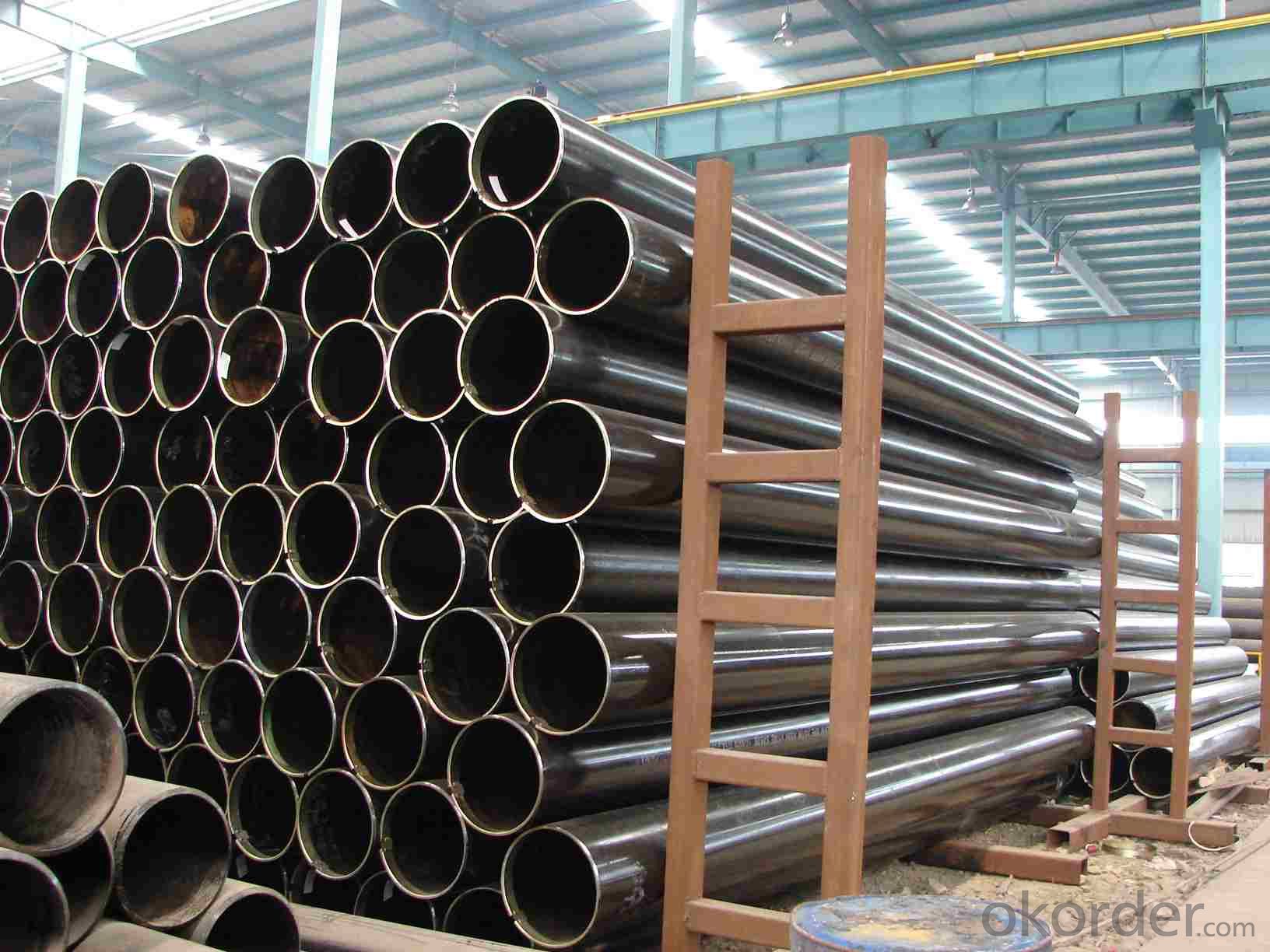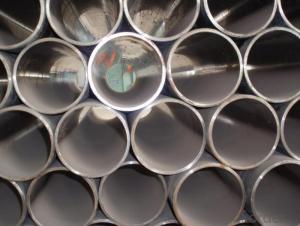Steel Pipe -- Welding Steel Tube Factory
- Loading Port:
- Tianjin
- Payment Terms:
- TT OR LC
- Min Order Qty:
- 25 m.t.
- Supply Capability:
- 8000 m.t./month
OKorder Service Pledge
OKorder Financial Service
You Might Also Like
1、Structure of Steel Pipe -- Welding Steel Tube Factory
Welded Steel Pipe is to be used for conveying gas, water, and petroleum foroil and natural gas industries. And used for structural steel pies purpose. As the manufacturing process does not include any welding, seamless pipes are perceived to be stronger and more reliable. Historically seamless pipe was regarded as withstanding pressure better than other types, and was often more easily available than welded pipe.
2、Main Features of Steel Pipe -- Welding Steel Tube Factory
• High manufacturing accuracy
• High strength
• Small inertia resistance
• Strong heat dissipation ability
• Good visual effect
• Reasonable price
3、Steel Pipe -- Welding Steel Tube Factory: Specification:
Standard | GB, DIN, ASTM ASTM A106-2006, ASTM A53-2007 |
Grade | 10#-45#, 16Mn 10#, 20#, 45#, 16Mn |
Thickness | 8 - 33 mm |
Section Shape | Round |
Outer Diameter | 133 - 219 mm |
Place of Origin | Shandong, China (Mainland) |
Secondary Or Not | Non-secondary |
Application | Hydraulic Pipe |
Technique | Cold Drawn |
Certification | API |
Surface Treatment | factory state or painted black |
Special Pipe | API Pipe |
Alloy Or Not | Non-alloy |
Length | 5-12M |
Outer Diameter | 21.3-610mm |
Grade | 20#, 45#, Q345, API J55, API K55, API L80, API N80, API P110, A53B |
Standard | ASME, ASTM |
1) Material:20#(ASTM A 106/A53 GRB.API5LGRB,GB),45#,16Mn,10#.
2) Specification range:OD:21.3-610mm,WT:6-70mm,length:6-12m or according to the requirement of clients.
3) Excutive standards:GB,ASME API5L.ASTM A 106/A53,Despite of the above standards,we can also supply seamless steel pipe with standard of DIN,JIS,and so on,and also develop new products according to the requirements of our clients!
4) Surface:black lacquered,varnish coating or galvanized.
5) Ends:Beveled or square cut,plastic capped,painted.
6) Packing:bundles wrapped with strong steel strip,seaworthy packing.
4、Packaging & Delivery
Packaging Details: | seaworthy package,bundles wrapped with strong steel strip |
Delivery Detail: | 15-30days after received 30%TT |
5、FAQ of Steel Pipe -- Welding Steel Tube Factory
①How is the quality of your products?
Our products are manufactured strictly according to national and internaional standard, and we take a test
on every pipe before delivered out. If you want see our quality certifications and all kinds of testing report, please just ask us for it.
Guaranteed: If products’ quality don’t accord to discription as we give or the promise before you place order, we promise 100% refund.
②How about price?
Yes, we are factory and be able to give you lowest price below market one, and we have a policy that “ for saving time and absolutely honest business attitude, we quote as lowest as possible for any customer, and discount can be given according to quantity”,if you like bargain and factory price is not low enough as you think, just don’t waste your time.Please trust the quotation we would give you, it is professional one.
③Why should you chose us?
Chose happens because of quality, then price, We can give you both.Additionally, we can also offer professional products inquiry, products knowledge train(for agents), smooth goods delivery, exellent customer solution proposals.Our service formula: good quality+good price+good service=customer’s trust
SGS test is available, customer inspection before shipping is welcome, third party inspection is no problem.
6、Steel Pipe -- Welding Steel Tube Factory: Images:

- Q:How are steel pipes used in the construction of hydroelectric power plants?
- Steel pipes are used in the construction of hydroelectric power plants for various purposes such as transporting water from the reservoir to the turbines, supporting and protecting electrical cables, and providing structural stability to the overall infrastructure.
- Q:Can steel pipes be used for marine applications?
- Yes, steel pipes can be used for marine applications. Steel pipes have high strength and durability, making them suitable for various marine environments and applications such as offshore drilling, shipbuilding, and underwater pipelines. The corrosion-resistant properties of steel pipes can be further enhanced by applying protective coatings or using corrosion-resistant alloys, ensuring their long-term performance in marine conditions.
- Q:How is the steel pipe dance installed at home?
- According to international competition practice, the standard size of steel tube is 40 mm or 45 mm in diameter, and the 45mm is usually used. The height of the steel pipe is not less than 3.3 meters and not higher than 4 meters. The steel pipe fittings used in the pipe dance are made of smooth surface material, usually chrome or polished by steel or iron.
- Q:What is the difference between hot-rolled and cold-rolled steel pipes?
- The main difference between hot-rolled and cold-rolled steel pipes lies in the manufacturing process. Hot-rolled steel pipes are produced at high temperatures, which results in a rougher surface and less precise dimensions. On the other hand, cold-rolled steel pipes are manufactured at lower temperatures, leading to a smoother surface finish and more accurate measurements. Additionally, the hot-rolling process allows for a wider range of steel grades and sizes, while cold-rolled pipes are generally limited in terms of thickness and diameter.
- Q:What's the difference between a rectangular tube and a rectangular steel tube?
- No difference, but your name is different, rectangular steel pipe, but can be divided into seamless rectangular steel pipe and welded rectangular, these two, in the material will also have a difference, I do not know how to help you
- Q:Can steel pipes be used for structural supports?
- Yes, steel pipes can be used for structural supports. Steel pipes are strong, durable, and have high load-bearing capacity, making them suitable for providing structural support in various applications such as buildings, bridges, and infrastructure projects.
- Q:How are steel pipes used in the chemical industry?
- Steel pipes are commonly used in the chemical industry for various applications including the transportation of corrosive chemicals, as well as for transferring fluids and gases at high temperatures and pressures. These pipes are durable, resistant to corrosion, and can withstand harsh working conditions, making them ideal for handling chemicals in industrial settings.
- Q:Can steel pipes be used for oil and gas transportation?
- Yes, steel pipes are commonly used for oil and gas transportation due to their strength, durability, and resistance to corrosion.
- Q:What are the factors to consider when selecting steel pipes for a specific application?
- When selecting steel pipes for a specific application, factors such as pipe diameter, wall thickness, material grade, corrosion resistance, temperature and pressure requirements, environmental conditions, and cost should be considered. Additionally, factors like durability, strength, weight, ease of installation, and compatibility with other components in the system should also be taken into account.
- Q:How do you measure the thickness of a steel pipe?
- Different methods can be used to measure the thickness of a steel pipe, depending on the required precision and available tools. Here, we present three commonly used approaches: 1. Calipers or Vernier Calipers: These are widely used and straightforward tools for measuring thickness. Place the jaws of the calipers on both sides of the pipe, ensuring they are perpendicular to the surface. Gently close the jaws until they touch the pipe, and then read the measurement on the caliper scale. 2. Ultrasonic Thickness Gauge: This method provides more accurate results and is commonly employed in industrial settings. An ultrasonic thickness gauge emits high-frequency sound waves that penetrate the steel pipe. By measuring the time it takes for the sound waves to bounce back, the gauge calculates the pipe's thickness. Before taking the measurement, ensure that the pipe surface is clean and smooth. 3. Magnetic Thickness Gauge: This method is specifically designed for measuring the thickness of ferrous materials like steel. The gauge incorporates a small magnet that adheres to the pipe surface. By applying a magnetic field, the gauge determines the distance between the magnet and the base plate. This distance corresponds to the thickness of the steel pipe. It is important to consider that each method has its own limitations in terms of accuracy. The choice of measurement technique should be based on the desired precision, availability of tools, and the specific requirements of the application.
1. Manufacturer Overview |
|
|---|---|
| Location | |
| Year Established | |
| Annual Output Value | |
| Main Markets | |
| Company Certifications | |
2. Manufacturer Certificates |
|
|---|---|
| a) Certification Name | |
| Range | |
| Reference | |
| Validity Period | |
3. Manufacturer Capability |
|
|---|---|
| a)Trade Capacity | |
| Nearest Port | |
| Export Percentage | |
| No.of Employees in Trade Department | |
| Language Spoken: | |
| b)Factory Information | |
| Factory Size: | |
| No. of Production Lines | |
| Contract Manufacturing | |
| Product Price Range | |
Send your message to us
Steel Pipe -- Welding Steel Tube Factory
- Loading Port:
- Tianjin
- Payment Terms:
- TT OR LC
- Min Order Qty:
- 25 m.t.
- Supply Capability:
- 8000 m.t./month
OKorder Service Pledge
OKorder Financial Service
Similar products
New products
Hot products
Related keywords





























